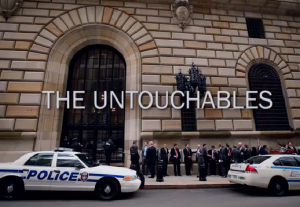Interview: Frontline’s Martin Smith Talks About The DOJ’s Failure To Prosecute Wall Street
The figure at the center of the Frontline episode is Assistant Attorney General Lanny Breuer, the prosecutor charged with investigating these crimes — and the one who hasn’t prosecuted any bankers.
“I think Breuer is looking for cases that he is certain he can win,” explains Smith. “And these mortgage securitization cases can be difficult cases. But as many experienced attorneys have told us, there appears to be ample evidence to proceed. They stress that it is not necessary that a prosecutor be certain he or she is going to win, only that he or she believes that the target is indeed guilty. Criminal prosecutors have told us that you are going to lose some. You can’t expect to have a perfect record.”
Smith does point out that deep-pocketed Wall Street banks and their many, many lawyers have the ability to overwhelm the FBI and DOJ with millions of pages of documents, thus making it hard to pick out those smoking-gun memos that can land a person in jail, but Smith adds, “it is not impossible.”
CONFLICT OF INTEREST?
Considering the unfathomable number of taxpayer dollars used to bail out the same banks whose executives could be facing prosecution, we wanted to know what Smith thought of the notion — especially in light of Breuer’s statement that he loses sleep at night about the future of these banks — that having a huge stake in these banks could have created a conflict of interest.
“Indicting a bank and causing it to possibly go out of business might be a valid concern in certain cases,” says Smith. “But that doesn’t preclude indicting individuals and taking them to court. I think when Breuer talks about losing sleep at night, it reveals his cautious approach generally. The fact remains that when it comes to prosecuting Wall Street banks for activities leading to the housing crisis and the great recession, neither banks, nor individual officers were charged.”
ONCE BITTEN, TWICE SHY
Federal prosecutors were burned early on when they failed to convict two Bear Stearns hedge-fund managers of fraud. Though Breuer denies it, some have said the worry about a second loss made the entire DOJ skittish about criminal prosecutions of Wall Street.
Yet Smith tells Consumerist that there may be good reasons to indict more executives, even if the DOJ fails a second time.
“Additional discoveries might come out during proceedings and might actually provide some valuable lessons and pitfalls to avoid for prosecutors,” he explains. “Also, a public that senses no one is fighting for them, might gain some sense that the Justice Department is at the very least trying. More whistle-blowers may want to come forward as well.”
CREDIBLE EVIDENCE
We asked Smith to put himself in Breuer’s position and, based on his research and all the parties he’s spoken to in recent years, decide whether or not he thinks there are winnable criminal cases out there.
“Put it this way, I examined several contracts between insurers (companies who insured the quality of the loans being sold) and the banks,” says Smith. “In pages of the disclosures, it clearly states that some of the loans inside the mortgage-backed securities may be defective or may not meet the standards set by the bank. But, ‘some’ does not mean defect rates like we’ve seen [NOTE: In the Frontline episode, whistle-blowers discuss defect rates of anywhere from 50% to more than 80%].
“Some insurers are suing for fraud. So are many investors. In some cases the banks have settled for sums in the billions of dollars,” he continues. “Of course, to successfully bring criminal charges against individual bankers requires a higher burden of proof. Prosecutors have to show that individual bankers knew that their contracts contained false representations and warranties. From talking to investigators and prosecutors, I believe, there is credible evidence that the bankers knew that they were misrepresenting what they were packaging, insuring and selling.
“Will prosecutors win every case, no,” he concludes, “but if they don’t attempt to bring some bankers before a jury they will of course never succeed.”
HOPE FOR THE FUTURE?
While the government has been shying away from criminal prosecutions, private lawsuits against big banks have been flourishing, and the state of New York has actually filed a suit against Bear Stearns/JPMorgan Chase. Many of the revealing documents that seem to indicate fraud at high levels — including the recently uncovered e-mails from a Morgan Stanley exec who joked about naming a mortgage-backed security “Nuclear Holocaust,” or “ShitBag” because he knew how toxic the loans were — have come from these suits.
So is there any hope that the revelations from these civil suits will finally result in criminal indictments?
“Not sure,” says Smith. “But New York Attorney General Eric Schneiderman was clear with us that he didn’t rule that out.”
But on the federal side, Smith says that his interview with Breuer left him with the impression “that the game was largely over.”
Unfortunately, federal securities law sets a statute of limitation for most fraud cases at five years, meaning it may be too late to prosecute cases where there is no documentation of fraud after 2007.
However, the SEC has taken a securities fraud case to the U.S. Supreme Court, arguing that the countdown clock for securities fraud cases should start at a time when investigators could reasonably detect the fraud. The Supremes are expected to rule on that case in June.
Finally, there came the news — less than 24 hours after the Frontline episode first aired — that Breuer would be making his exit as head of the AG’s criminal division.
“As to how Wall Street feels about Breuer stepping down, I can’t say,” Smith tells Consumerist. “Clearly they will be watching closely to see who replaces him.”
Want more consumer news? Visit our parent organization, Consumer Reports, for the latest on scams, recalls, and other consumer issues.


